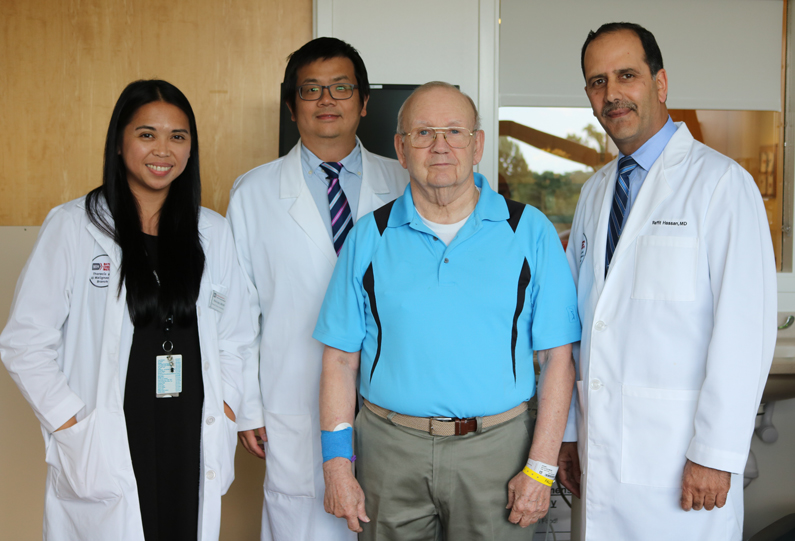Content on this webpage is provided for historical information about the NIH Clinical Center. Content is not updated after the listed publication date and may include information about programs or activities that have since been discontinued.

On July 23, researchers in the NIH Clinical Center treated the first patient in the U.S. with radioisotope Thorium-227 for mesothelioma. The clinical trial uses Thorium-227 to target and attack a protein called mesothelin, which is highly expressed in many cancers.
Thorium-227 is an unstable radio-isotope that emits an alpha particle upon undergoing radioactive decay, explained Dr. Frank Lin, Chief of the Targeted Radionuclide Therapy Section at the National Cancer Institute (NCI). According to Lin, who is the clinical authorized user for the radioactive administration of the thorium at the NIH Clinical Center, most current forms of systemic radiation therapy using radionuclides emits radiation particles that are very small such as beta particles. But, the higher the mass or energy of the emitted particle, the more tumor damage can be done. Alpha particles, such as Thorium-227, are several thousand times larger than beta particles. Before now, alpha emitters have never been used to treat patients at NIH.
The new drug being tested (BAY 2287411) is made up of two components that are combined into one molecule. First is an antibody that allows the drug to locate and target the mesothelin protein on the cancer cells. Second is the Thorium-227, which is the "active ingredient" of the combined molecule. This is akin to having a smart bomb against cancer cells, where the antibody provides the targeting system, and the Thorium-227 is the radioactive payload. Once bound to tumor cells, the thorium undergoes its natural radioactive decay and exposes tumor cells to lethal doses of alpha radiation.
"Our goal is to demonstrate the safety and tolerability of this drug and to get preliminary evidence of anti-tumor efficacy," said the study's principal investigator, Dr. Raffit Hassan, the Chief of the Thoracic and GI Malignancies Branch and Head or the Thoracic Oncology Section at NCI. "This is a treatment for patients with mesothelioma and ovarian cancer who have failed standard therapies and provides a new treatment approach for treating their cancer."
For more than two decades, Hassan and colleagues have been investigating the protein mesothelin as a target for cancer therapy.
"It feels exciting thanks to the work by Frank and [the NIH Office of Research Services] Division of Radiation Safety. They have been critical in working with the Nuclear Regulatory Commission to allow us to use the Thorium radio-conjugate here. It is a very complicated process, but because of a lot of their work we were able to do it and hopefully this opens the door for Alpha therapies not only for targeting mesothelin but other cancers," Hassan said.
While it may take a number of years to conduct the trial and assess its effectiveness, Hassan said if successful, it could be used on other cancers such as lung cancer and pancreatic cancer.
- Molly Freimuth

